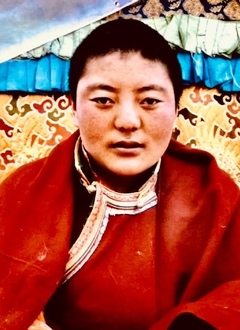Guidance That Lights the Way to Liberation
English | Français | 中文 | བོད་ཡིག
Guidance That Lights the Way to Liberation
by Jetsünma Mumé Yeshe Tsomo
I prostrate to the root guru, indivisible from the Lake-Born Lord,
Single embodiment of the three secrets of all the victorious ones,
As I explain the essence of instructions lighting the way to liberation.
You, intelligent ones who are interested, listen with appreciation!
When fortunate people travel the road to liberation,
They must first search for the entrance to the way,
Which is the source of excellence in this and future lives:
It’s crucial to restrain the mindstream with pure ethical discipline.
From a preceptor or master who possesses the sets of five qualities,[1]
Receive the prātimokṣa vows of fourfold or sevenfold abandonment.[2]
This will not occur if you lack determination to be free.
The thought of renouncing existence is therefore important.
From a learned spiritual mentor who upholds the Mahāyāna vows,
Take the bodhisattva vows of aspiration and application through the ritual of the two traditions.[3]
If you do not have the commitment with twin aspects,[4] then the vows are merely a reflection.
Train again and again, therefore, in intention and compassion.
From a powerful vajra-holder with eight qualifications,[5]
Take on the samayas related to the four empowerments.
They will not be obtained if two causes and four conditions are absent,[6]
So strive in the methods for proper acquisition and protection.
Having thus established a basis of pure ethical discipline,
Focus on the essential meaning of the sūtras through study and reflection,
And, with the torch of the key points of noble masters’ pith instructions,
Look into the secret of your mind, the ultimate guide.
Through the common, uncommon and special forms of mind training,
Gradually purify your mindstream and become a suitable vessel for Dharma.
If you do not tame your habitual patterns of negative thought,
Applying pith instructions will be like trying to cultivate high ground in winter.
The Great Perfection is the pinnacle of the ocean of sūtra and mantra.
Generate the power of intense appreciation, aspiration, and diligence
For these instructions for traversing the paths and levels all at once,
And take them to heart with a focus on the essential meaning.
Practicing in this way will give significance to the freedoms and advantages,
And you will discover the confidence of being without regrets at the time of death.
Through the joyous celebration of spontaneously accomplishing twofold benefit,
You will show yourself immense kindness, as your mind is happy and at ease.
Through the virtue of speaking these words,
May the Sage’s teachings flourish and all beings be happy.
May I too, in all my lives to come,
Bring vast waves of benefit to others.
This was written in the Hermitage of Great Secret Liberation into the Body of Light[7] on the twenty-fifth day of the ninth month of the Iron Dragon year[8] by the śramaṇerikā follower of Śākyamuni called Mumtso in response to a request from some lamas and monks who hold the dharma lineage of Orgyen Mindrolling. May it bring virtue and excellence!
| Translated by Adam Pearcey, 2024.
Bibliography
Tibetan Editions
nyag rong mkhan po bkra shis dbang rgyal. rje btsun ma mu med ye shes mtsho mo’i bstod pa phyogs bsgrigs. 1 vol. gser rta rdzong: bla rung mdo sngags rig paʼi chos tshogs nas dpar du bskrun. (W3CN4630), pp. 6–8
mkha' 'gro ma mu med ye shes mtsho mo. “bslab bya thar lam rab snang.” In mkha' 'gro'i chos mdzod chen mo. Lha sa: Bod ljongs bod yig dpe rnying dpe skrun khang, 2017. Vol. 30: 47–48.
Secondary Sources
Jamgön Kongtrul Lodrö Tayé. Buddhist Ethics. Ithaca: Snow Lion, 1998
Version: 1.1-20240628
-
On the twenty-one sets of five characteristics possessed by a pratimokṣa preceptor, see Jamgön Kongtrul Lodrö Tayé, Buddhist Ethics, Ithaca: Snow Lion, 1998, pp. 336–338, n. 27 ↩
-
Fourfold abandonment (spong ba bzhi) here refers to the four basic precepts of not taking life, not taking what is not given, avoiding sexual misconduct and not lying. Sevenfold abandonment (spong ba bdun) means avoiding the three unvirtuous actions of the body (taking life, taking what is not given, and sexual misconduct) and the four of the speech (lying, divisive talk, harsh speech, and idle gossip). ↩
-
The traditions of Profound View initiated by Nāgārjuna and that of Vast Conduct initiated by Asaṅga. ↩
-
The two aspects are 1) focusing on sentient beings with compassion, and 2) focusing on perfect enlightenment with wisdom. ↩
-
According to Buddhaguhya, a teacher of secret mantra should 1) hold the treasury of the view, 2) meditation, and 3) action of secret mantra, 4) have perfected the four rivers of empowerment, 5) be skilled in presenting the teachings to students at the appropriate level, 6) be learned in the tantras and activity, 7) know how to put the instructions into practice, and 8) have gained the ‘warmth’ of experience. ↩
-
This refers to the associated or concomitant (mtshungs ldan gyi rgyu) and cooperative causes (lhan cig byed pa’i rgyu) and the causal (rgyu’i rkyen), dominant (bdag po’i rkyen), objective (dmigs rkyen) and immediately preceding conditions (de ma thag rkyen). ↩
-
An alternative name for Larung Gar. ↩
-
There was no twenty-fifth day that year, but the ḍākinī day celebration would have been held on the twenty-sixth, corresponding to 21 November 2000. ↩
